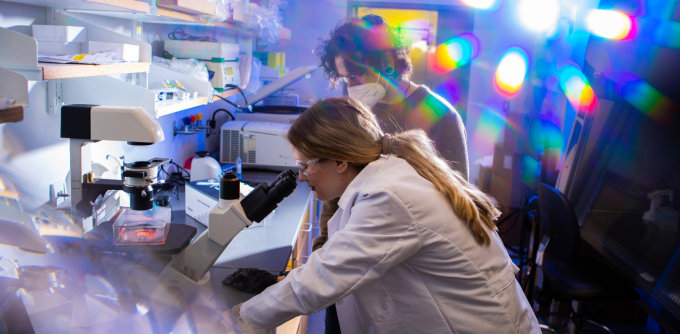Biological Sciences at UB

Explore life from molecules to ecosystems
Biological science is the study of how living things work, change and interact. At the University at Buffalo, you will learn biology by doing biology through hands-on labs, research opportunities and close faculty mentorship that helps you build real scientific skills from the start. Whether you are curious about human health, the environment, genetics or discovery-driven research, biological sciences at UB gives you the foundation and flexibility to explore what matters to you.
Biology connects big questions to real-world impact. Studying biological sciences helps you understand life at every level and apply that knowledge to challenges facing people and the planet.
As a biological sciences student, you will learn how to:
- Ask clear research questions and test them with evidence
- Collect, analyze and interpret scientific data
- Work confidently with lab tools and experimental methods
- Communicate scientific ideas clearly through writing and presentations
These skills are valuable across health professions, research, education and many science-connected careers.
The Department of Biological Sciences combines strong teaching with active research in a way that keeps students at the center of the experience. At UB, you learn from faculty who care deeply about teaching and mentoring while also advancing knowledge in the life sciences.
What sets UB apart:
- A long tradition of teaching excellence, including award-winning instructors
- A curriculum built around learning by doing, with labs at the core
- Faculty who welcome students into research and discovery
- Clear guidance and advising to help you plan your academic path
Students are encouraged to ask questions, try new approaches and grow into confident scientists over time.
Why UB?
UB is a place where you can challenge yourself, find your community and build a future. As New York’s flagship public research university, UB gives you the power of an R1 institution and the support of a campus that feels welcoming from day one.
What you’ll experience at UB
- Affordable excellence: Earn a top-tier education at a cost that supports your goals.
- Collaborative community: Learn from faculty and peers who care about your growth.
- Built-in opportunity: Get experience through research, internships and student clubs.
- A vibrant place to live: Buffalo offers friendly neighborhoods, a lively arts and food scene and easy access to Toronto and New York.
The UB difference
UB students get big-university advantages without losing the personal connections that make college meaningful. You’ll join a campus that encourages curiosity, celebrates different perspectives and gives you room to explore your path.
Biological sciences at UB is built around hands-on learning. From your first year onward, labs are central to how you develop understanding and confidence.
You will connect ideas from class to real experiments, work alongside classmates with different interests and learn directly from faculty who are active researchers. As you move forward, learning becomes more independent and more focused on your goals.
Research in the Department of Biological Sciences explores life across scales, from molecules to ecosystems. Faculty and students work together to advance understanding using modern tools and hands-on investigation.
Faculty research areas include:
- Animal systems biology: How complex physiological systems function
- Cell and molecular biology: How genetic information becomes functional biology
- Cell signaling: How cells communicate and respond to their environment
- Ecology and evolution: How organisms adapt and interact in natural systems
- Fungal biology: How yeasts and fungi model gene regulation and growth
- Genetics: How genes are regulated and expressed across systems
- Genomics: How genomes change over time and shape evolution
- Microbiology: How microorganisms interact with environments and hosts
- Neuroscience: How nervous systems process information and how dysfunction leads to disease
- Plant biology: How plants grow, photosynthesize and adapt to stress
Students often begin by learning techniques and asking questions, then gradually take on more responsibility as their confidence grows.
Whether you are preparing for health professions, research careers or science-focused work across industries, biological sciences at UB gives you the tools and support to move forward with confidence.
Explore your options and take the next step toward applying.








